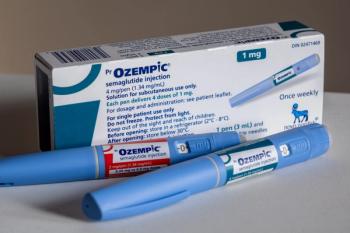
Diabetes
Latest News
Latest Videos
Podcasts
CME Content
More News

Recent cuts to federal grants are set to have a widespread impact across numerous scientific and medical studies.

This new study has found perceived discrimination in health care leads to delayed visits, especially among younger and minority patients.

Study links short sleep and snoring to increased type 2 diabetes risk in women with prior gestational diabetes.

This study offers new insights to self-insured employers and health plans related to investment in digitally based disease management programs and enrollee engagement.

A new clinical trial finds no cardiovascular benefit from high-dose multivitamins, with or without chelation therapy, in patients with diabetes and past myocardial infarction.

New diabetes medications are pressuring Medicare Part D financially as they drive up prescription drug costs amid rising rates of type 2 diabetes and obesity.

According to a review of hospital-based cross-sectional studies, almost half the type 2 diabetes population is micronutrient deficient.

Patients with diabetes and chronic kidney disease receiving physiologic insulin resensitization had much lower annual costs of care than similar patients not receiving it.

A collaboration between a drug plan and clinical pharmacists led to nearly 50% of members successfully switching to a preferred dipeptidyl-peptidase-4 inhibitor.

According to Ian Neeland, MD, strategies like pharmacist-led counseling, patient education programs, and patient assistance initiatives are key to addressing therapeutic inertia.

The approval marks the second for a generic in this class of medications indicated to improve glycemic control in patients with type 2 diabetes as a complement to diet and exercise.

The FDA issued a complete response letter for sotagliflozin (Zynquista) as an adjunct to insulin therapy for glycemic control.

Ian Neeland, MD, discusses the CINEMA program's impact on addressing social determinants of health (SDOH) in Ohio and the importance of precision risk tests to reduce cardiovascular metabolic disease risk.

Ellen Francis, PhD, discusses the benefits, challenges, and future implications of implementing earlier diabetes screening for pregnant women.

Patients with type 2 diabetes who use semaglutide have more than double the risk of severe optic nerve damage than those who don’t use the drug.

This year’s top diabetes content focused on pediatric metabolic health, misconceptions about weight loss drugs, and more.

Reducing systolic blood pressure to less than 120 mmHg lowered the risk of major cardiovascular events for most people with type 2 diabetes in the Blood Pressure Control Target in Diabetes trial.

Young adults with type 2 diabetes and lower incomes face significantly higher mortality risks, highlighting socioeconomic disparities in health outcomes.

Employees living with diabetes often face unique challenges, such as managing blood sugar levels, balancing medication, and preventing complications, all while maintaining their professional responsibilities. This condition can lead to increased absenteeism, reduced productivity, and rising health care costs.

Sanjula Jain, PhD, chief research officer at Trilliant Health, discusses the rapid adoption of glucagon-like peptide 1 inhibitors for diabetes and preventive care for obesity and late-onset diabetes.

Unmet social needs in certain neighborhoods contribute to disparities in diabetes care, leading to greater reliance on emergency services, fewer preventive measures, and higher rates of complications.

Recent results from a new diabetes reversal program demonstrate the reliable, sustained benefits of nonpharmacological interventions in the management of diabetes and overall health of patients.

The 2024 Trends Shaping the Health Economy report gave a past, present, and future look at diabetes care in the US and the role of obesity in these trends.

The Senate HELP Committee held a hearing to address the high cost of semaglutide drugs, finding that many patients cannot afford them despite their potential benefits.

The Federal Trade Commission (FTC) has filed a legal complaint accusing the 3 largest pharmacy benefit managers (PBMs) in the US—Caremark, Express Scripts, and Optum Rx—of inflating insulin costs for patients, prompting renewed calls for PBM reform.




















